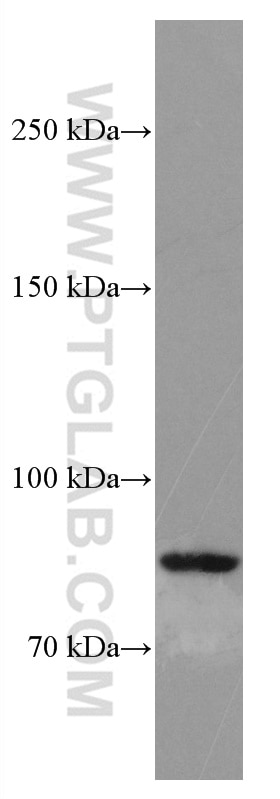Anticorps Monoclonal anti-SMYD4
SMYD4 Monoclonal Antibody for WB,ELISA
Hôte / Isotype
Mouse / IgG1
Réactivité testée
Humain
Applications
WB,ELISA
Conjugaison
Non conjugué
CloneNo.
2F4B7
N° de cat : 66874-1-Ig
Synonymes
Galerie de données de validation
Applications testées
| Résultats positifs en WB | cellules MCF-7, |
Dilution recommandée
| Application | Dilution |
|---|---|
| Western Blot (WB) | WB : 1:1000-1:6000 |
| It is recommended that this reagent should be titrated in each testing system to obtain optimal results. | |
| Sample-dependent, check data in validation data gallery | |
Informations sur le produit
66874-1-Ig cible SMYD4 dans les applications de WB,ELISA et montre une réactivité avec des échantillons Humain
| Réactivité | Humain |
| Hôte / Isotype | Mouse / IgG1 |
| Clonalité | Monoclonal |
| Type | Anticorps |
| Immunogène | SMYD4 Protéine recombinante Ag11552 |
| Nom complet | SET and MYND domain containing 4 |
| Masse moléculaire calculée | 804 aa, 89 kDa |
| Poids moléculaire observé | 85-89 kDa |
| Numéro d’acquisition GenBank | BC035077 |
| Symbole du gène | SMYD4 |
| Identification du gène (NCBI) | 114826 |
| Conjugaison | Non conjugué |
| Forme | Liquide |
| Méthode de purification | Purification par protéine G |
| Tampon de stockage | PBS avec azoture de sodium à 0,02 % et glycérol à 50 % pH 7,3 |
| Conditions de stockage | Stocker à -20°C. Stable pendant un an après l'expédition. L'aliquotage n'est pas nécessaire pour le stockage à -20oC Les 20ul contiennent 0,1% de BSA. |
Informations générales
SMYD4, also named as SET and MYND domain-containing protein 4, is a 804 amino acid protein, which contains 1 MYND-type zinc finger and 1 SET domain. SMYD4 belongs to the class V-like SAM-binding methyltransferase superfamily. SMYD4, as a potential tumor suppressor, plays a critical role in breast carcinogenesis at least partly through inhibiting the expression of Pdgfr-alpha, and could be a novel target for improving treatment of breast cancer. SMYD4 is a muscle-specific transcriptional modulator involved in development.
Protocole
| Product Specific Protocols | |
|---|---|
| WB protocol for SMYD4 antibody 66874-1-Ig | Download protocol |
| Standard Protocols | |
|---|---|
| Click here to view our Standard Protocols |


